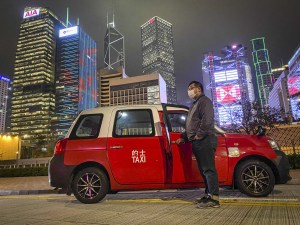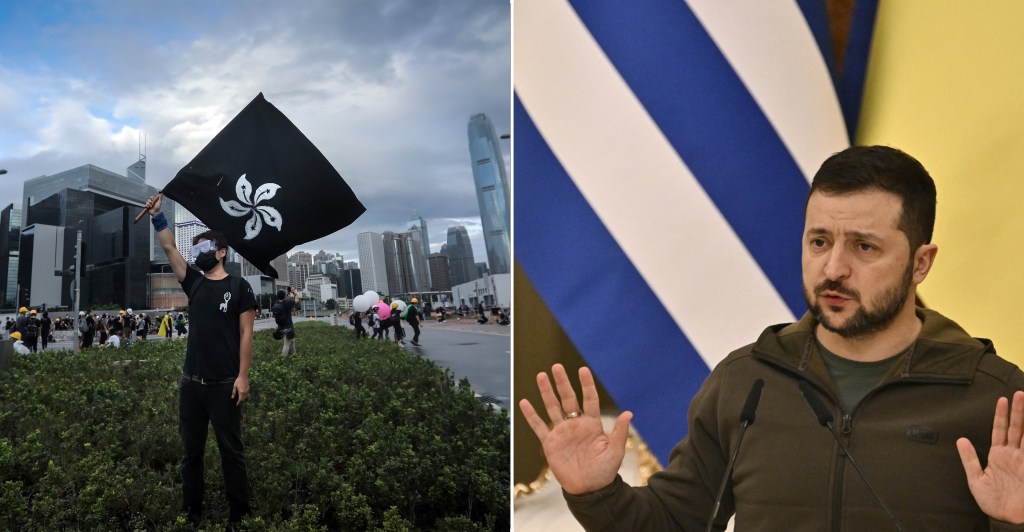In 1997, Chiu, a primary school teacher in Hong Kong, made the painful decision to send his family abroad, out of fear for what the future held as the former British colony returned to Chinese rule later that year.
Twenty-five years later, tens of thousands of Hong Kong residents are pondering similar decisions amid another wave of exodus. “The difference is that people are now leaving not because of the political uncertainty, but the drastic changes happening before their very eyes,” Chiu told VICE World News, requesting the use of only his last name to avoid government repercussions.
Videos by VICE
The most visible symbol of this change, for instance, are the red flags fluttering across Hong Kong this week, as the city gears up for the 25th anniversary of the handover on Friday, when Chinese President Xi Jinping will inaugurate the new administration headed by John Lee, a hard-line former cop.

The symbolic day also marks the halfway point of the “One Country, Two Systems,” a governing rubric that once underpinned the city’s high degree of autonomy. This model is supposed to last fifty years as stated in the Sino-British Joint Declaration. But to many, the principle and the rights it guarantees now exist only in name.
“Beijing has repeatedly emphasized that the Sino British Joint Declaration is a historical document that has lost its contemporary relevance. It amounts to saying they are no longer bound by the agreement,” said Ho-fung Hung, a sociology professor at Johns Hopkins University.
His view is echoed by Chris Patten, the last British governor of Hong Kong. “China has ripped up the joint declaration and is vengefully and comprehensively trying to remove the freedoms of Hong Kong because it regards them as a threat, not to the security of China but to the ability of the Chinese Communist Party to hang on to power,” Patten told AFP in a recent interview.

To put an end to pro-democracy protests that embroiled the city in 2019, Beijing upended Hong Kong with a broad national security crackdown that put critics, opposition lawmakers, and journalists behind bars and drove legions of activists into exile. The city has been “reborn from the ashes,” Xi declared upon his arrival in Hong Kong on Thursday.

But for many residents like Chiu, who cherished the civil liberties and way of life they have known for most of their lives, this new Hong Kong is wholly unrecognisable. “The regime resorted to the method of boiling the frog in the past to gradually change Hong Kong people’s mind. But now it has bared its teeth,” Chiu said.

Another notable change in recent years is the Hong Kong government’s systematic erasure of memories of the Tiananmen Square massacre. From monuments at university campuses to books at libraries, anything that could remind people of Beijing’s bloody crackdown on pro-democracy protests in 1989 vanished over the past year.
In the three decades that followed the bloody crackdown in central Beijing, thousands of Hong Kong residents joined an annual vigil at Victoria Park every June 4 to commemorate its victims. But the field stood empty for the past two years, as former organizers were jailed and public assemblies were banned on the pretext of pandemic safety.

Last year, Beijing rewrote the rules of Hong Kong’s electoral system to ensure only “patriots” could run for public office. The move effectively eliminated opposition lawmakers from the legislature, reducing it to a rubber stamp.

For many families who chose to leave, the last straw was the overhaul of the city’s education system, which, by influencing the next generation, could have the most far-reaching impact on the future of Hong Kong.
At schools, where students had formed human chains and chanted protest slogans in 2019, ceremonies where China’s flag is raised have now become a weekly affair.
A primary school teacher who teaches general studies found the changes difficult to accept. With every new textbook revision, part of Hong Kong’s history and identity is lost. Mentions of the separation of powers disappeared from teaching materials in 2020. The latest textbooks claimed Hong Kong was never a British colony, as China supposedly held sovereignty over the territory all along and that it was forcibly occupied by the British.
But she neither corrected her students when they omitted Taiwan from a map of China, nor berated a pupil when he blurted out “not again” during the flag-raising ceremony. Instead, she conducted conformity experiments in class to remind them that those in authority are not necessarily correct. “I hope to train them to think for themselves,” she told VICE World News, requesting anonymity to avoid repercussions.

While China now has a firm grip on Hong Kong, this seems to validate what Hung, the Johns Hopkins sociologist, said was the unsettled future of the city.
“Even after full absorption into one country, local identities and resistance would still persist within the territory and overseas,” Hung said.








